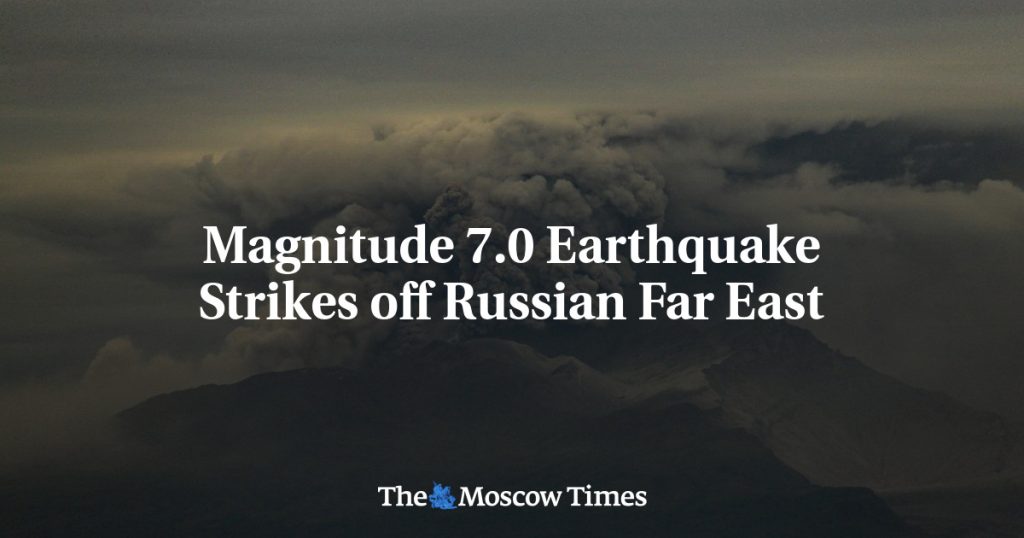A magnitude 7.0 earthquake struck off the coast of Russia’s Far East Kamchatka Peninsula early Sunday morning local time. The local emergencies ministry reported that tremors were felt along the coast, including in the region’s capital Petropavlovsk-Kamchatsky. Operational teams of rescuers and firefighters were dispatched to inspect buildings in the region. The earthquake occurred at a depth of nearly 50 kilometers just after 7:00 am local time, approximately 90 kilometers east of Petropavlovsk-Kamchatsky, as reported by the United States Geological Survey. Despite initial concerns, the U.S. National Tsunami Warning Center later confirmed that the threat had passed, and local authorities did not issue a tsunami alert.
Following the initial earthquake, several aftershocks were recorded, but of lower intensity, according to the Kamchatka branch of Russia’s Unified Geophysical Service. The Kamchatka Peninsula lies on a seismically active belt surrounding most of the Pacific Ocean, referred to as the “Ring of Fire.” This region is home to more than two dozen active volcanoes, contributing to its geological volatility. The occurrence of earthquakes and volcanic activity is not uncommon in this area, highlighting the need for local authorities to be prepared for such events. While the initial earthquake caused concern, the absence of a tsunami threat and the relatively low intensity of the aftershocks provided some relief to residents in the region.
Despite the natural disasters that frequently impact the Kamchatka Peninsula, the area’s geographical features and active geological landscape continue to draw a significant amount of scientific interest. The “Ring of Fire,” which surrounds the Pacific Ocean, encompasses the peninsula and is known for its geological activity, including earthquakes, volcanic eruptions, and tsunamis. Researchers and geologists study this region to better understand the Earth’s tectonic processes and the impact of these phenomena on the local population and infrastructure. The recent earthquake serves as a reminder of the importance of ongoing scientific investigation and preparation for future events in this seismically active area.
The Moscow Times, a prominent news outlet in Russia, faces challenges due to government crackdowns on independent journalism. The publication has been labeled as an “undesirable” organization by the Russian Prosecutor General’s Office, leading to potential risks for its staff members. Despite these obstacles, The Moscow Times remains committed to providing accurate and unbiased reporting on Russia and its leadership. The publication relies on reader support to continue its work against censorship and repression. By standing with The Moscow Times and supporting independent journalism, readers can help defend the freedom of the press and access to reliable information in the face of adversity. Your contributions, no matter the size, can make a significant impact on sustaining independent media in Russia.
The actions taken against The Moscow Times reflect broader trends of media suppression and censorship in many parts of the world. Independent journalism plays a crucial role in holding governments and powerful entities accountable, providing citizens with important information and fostering transparency in society. The challenges faced by The Moscow Times highlight the ongoing struggle for press freedom and the need for solidarity in supporting independent media outlets. The silencing of journalists and restriction of information undermines democratic principles and poses a threat to freedom of expression. By standing with organizations like The Moscow Times, readers can contribute to upholding the values of free speech and a free press in an environment that seeks to suppress dissenting voices.
In the face of adversity and government pressure, The Moscow Times remains committed to its mission of delivering accurate and objective reporting on Russia. The publication’s journalists continue to work tirelessly to provide the public with valuable insights and analysis on important issues affecting the country and its citizens. By supporting The Moscow Times, readers can play a vital role in safeguarding independent journalism and maintaining access to diverse perspectives in a climate of censorship and repression. The challenges faced by The Moscow Times serve as a reminder of the importance of defending press freedom and upholding the principles of democracy in an increasingly hostile media environment. Stand with The Moscow Times in supporting open and independent journalism in Russia and beyond.














